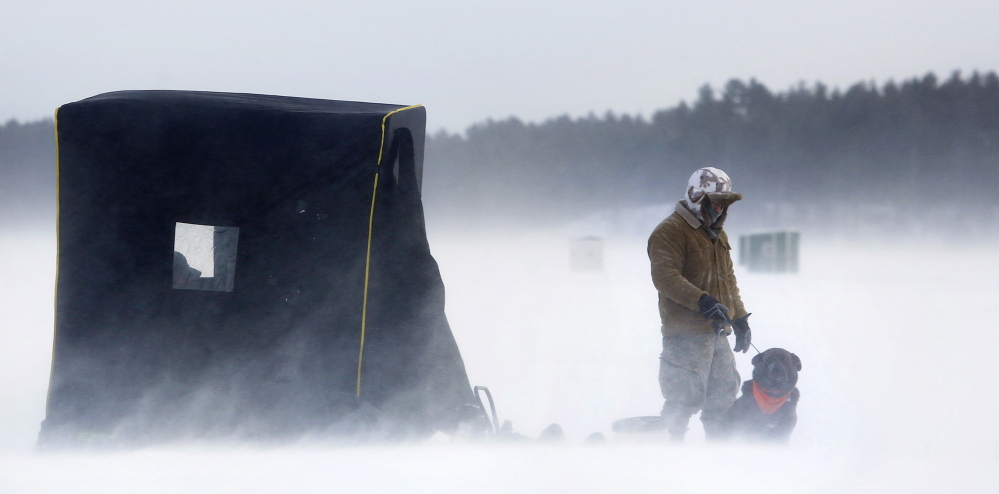STANDISH — If Jeff Bowers and Brian Hopkins of Gorham go to the Sebago Lake Rotary Ice Fishing Derby next weekend, it won’t be for the competition.
Likewise for Greg Symalla of Windham and his sons, Luke and Sam. And Al Asselin and his son, Alan, may not compete in the derby, either. But they still may come to the lake to set some traps and, well, fish.
Odd as it may sound, the Sebago ice fishing derby – which bills itself as “Maine’s largest and richest” – has come back to its roots. This year’s derby is the most scaled-down version yet. And ice fishermen seem good with that.
“I may go just to fish and not enter the derby,” Al Asselin said. “I’ve got three kids I raised snowmobiling, four-wheeling, ice fishing, anything you can do outside. I brought them ice fishing since they were old enough to bundle up.”
In the 15 years since the derby was launched, the event has been remade several times by the Sebago Lake Rotary Club.
This year, organizers are foregoing the ice-shack competition and the snowmobile radar run. In past years there was an Air Force flyover, and a village of food vendors that filled Raymond Beach.
The focus of this year’s derby simply will be fishing for togue, which was what the founders had in mind.
Started by ice fisherman Tom Noonan and the Sebago Lake Rotary Club to help state biologists cull the togue in the landlocked salmon fishery, the derby quickly turned into a winter festival.
At one time it grew to a statewide event. Then there was the $100,000 prize rolled out to inspire fishermen to catch a state-record lake trout and break Hollis Grindle’s 1958 record of 31 pounds, 8 ounces.
Three years ago the statewide event was scrapped and replaced by a Cumberland County derby, an alternative that could be held if the 30,500-acre Sebago didn’t freeze.
Now organizers say the derbies – with their combined purse of more than $20,000 – have settled into a format that works.
The Sebago Lake and Cumberland County derbies will be held concurrently on Feb. 14-15.
“I believe the (Cumberland County) derby is going to be here to stay,” said derby director Debbie McPhail.
Last weekend on Sebago Lake, with a wind chill of 4 below zero, Symalla and his two sons stood in a portable shack that broke the bite of the wind driving across the lake. They were happy to be there at 8 a.m. in pursuit of lake trout. Sometimes, they said, they come at night and fish for cusk, which can be even more fun.
Like many Maine ice fishermen, the Symallas feel the highlight of the Sebago derby is what transpires in their own shack: cooking breakfast, the campfire dinner, and maybe some night fishing.
“We bought our tickets this morning. For the derby we’ll go a little farther out. Last year we caught some pretty good lake trout,” said Symalla, 50.
It’s the same for Bowers and Hopkins, buddies who ice fish as often as they can. They’ll probably fish one of the two days next weekend on Sebago, but Bowers said they will enter the derby to celebrate the sport rather than to compete for prizes.
“We’ve been out during the derby and not entered,” Bowers said.
Then there is Al Asselin of Arundel and his son, Alan, of Buxton. They enjoy ice fishing but rarely enter derbies. With their Labrador-English-mastiff mix, Julian, they’ll brave any weather, even when it’s minus-30 in a cove of Moosehead Lake.
“The fishermen who come are true fishermen. That’s what they’re out there to do, to enjoy their sport. The other activities can sometimes be a distraction,” said Cyndy Bell, one of the volunteers at the Sebago Lake Rotary Club.
The Sebago derby still will feature ice skating for kids, a polar-ice dip that raises money for the Children’s Miracle Network, and hot-air balloon rides. But it’s largely stripped down from what it once was, Bell said. The kids’ derby, in which 500 traps are given away, has been shifted to March 7.
McPhail, the derby director, eventually wants to bring back some of the festivities at Raymond Beach – maybe dog-sledding or horse-drawn carriages. But she said one thing is certain: the countywide format is here to stay.
“We saw a lot more families last year,” Bell said. “I think that’s positive
“We’re so cabin-bound during the winter. What does one do? If you can’t afford to snowmobile or ski, this is very affordable, and everyone can be a part of it and do it together.”
Send questions/comments to the editors.



